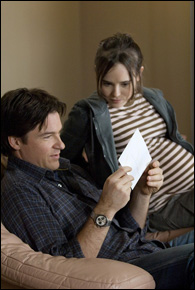

|
| home | movie reviews | features | sov horror | about | forum |
The Juno Interviews, Part II: Jason Bateman
Some of us grizzled old coots still think of Jason Bateman as Ricky Schroeder's snotty friend Derek on Silver Spoons. He's worked steadily -- if not always prominently -- since then, gathering a large array of television series that never quite found the traction to break out. That was until he landed the role of Michael Bluth, the lone voice of sanity in the cult series Arrested Development. Though it lasted only two-and-a-half seasons, the accolades it earned -- helped in no small part to Bateman's spot-on comedic timing -- established it as a modern classic. A string of high-profile movie roles soon followed, topped by this winter's Juno, where he plays the feckless adoptive father of the titular teen's incoming baby. Shortly before the film opened, he sat down to talk with the press about it, Arrested Development, and other projects. Question: How old was your kid before you started this? Jason Bateman: She was born October 28. We shot this... I think I had had her by the time we started. There was a question as to whether I was going to get back for the delivery. Q: So how does that or did that contribute to your character? JB: Well, there's the idea of making sure that you are an adult before you start having adult stuff come into your life. I was pretty good about getting a lot of crap out of my life before I got married and had a kid. Things work out better that way, I hear. (Laughter.) So far, it is turning out to be true. Mark, the character that I play, did not get that memo. He's still sort of stuck in a bit of an arrested development and his life is not going so great as a result. He finds someone who enables that in Juno, and maybe that's what that last scene is about. He wants to continue being a much closer friend with her outside of the relationship with Vanessa [his onscreen wife, played by Jennifer Garner]. I don't know if it's because he wants to date her or just simply hang out with her a little less apologetically. Reitman and I never really landed on which it was going to be. I begged him to tell me, and I said I'd play it ambiguous if he wanted me to, but he never let me know. Fucker. (Laughter.) So I kind of had to dance the middle and hope that he cut it together in a specific way or an interesting way... which he did, I think. Q: I spent a lot of the movie saying to myself, "Okay, this is the scene where Mark learns a valuable lesson from Juno and stays with his wife and has the kid." And that obviously never happened. Was that part of what drew you to this? And how do you keep your character sympathetic when he doesn't always do sympathetic things? JB: Well first of all, the only thing that drew me to this project was who was doing it. I came on very, very late. So the whole cast was already set. The script obviously did not suck, and it was a real kind of no-brainer. It was just a couple of weeks in Vancouver... plus I just had the baby and you know, those fuckers cry. (Laughter.) I called my agent and said "anything out of town?" Seriously, as far as keeping him sympathetic, I thought it simply more interesting to play a guy who's a little bit guilty about not growing the way everybody else in the story does. Everybody else seems to kind of emancipate themselves and/or take a big proactive step forward in life, and he doesn't. He's somewhat righteous about that at some point. I tried to sort of fit that in with the sense that he has a little bit of guilt about it that you can sort of empathize with. At least the guys in the audience would, I hoped. Because any guy north of 20 starts to have to deal with -- or has already dealt with -- the reality of being an adult. And with that comes a more substantial relationship with a girl who might not be some incredible arm piece, but somebody you can actually get along with beyond sleeping with her a few times. And then maybe think about having a kid, and maybe a better job: one that you might not like as much but which pays better and speaks more to the future. I mean, there is that moment where a guy has to start flirting with being a man. And it's a little scary, and you're kind of left to do it on your own. You don't have a teacher or a father probably in the house motivating you to do that. There's a lot of self-motivation. Mark doesn't really have the balls to do that or the work ethic to do that. You can empathize with a guy like that. It's a little pathetic, but I hope it's interesting to watch as opposed to being just sort of a one-dimensional prick. Q: Can you talk about Ellen [Page] and Michael [Cera]? JB: Well, Ellen was very easy to be good with. She doesn't do a lot of acting. I mean she's very, very natural. Those were real simple scenes. With Michael, it's the same thing... although he did not have any scenes with me in this movie. But they are both very, very good at not spinning dialogue or looking for the home run and trying to solicit as much laughter as they can. They are not hams. That's really important with a script as stylized as this. Because if you get actors in there who are trying to hit home runs with every one of these quirky lines of dialogue, it just becomes just an eye-rolling fest. I think they're both smart enough and have a small enough ego that they can let themselves just disappear into the parts and let the script and Reitman's technique be the stars. They really, really deserve a lot of respect for that, especially coming from two people who are about 20. You know, that's usually the hammy age for actors. It was for me. Q: You were doing The Kingdom when this job came up, where you were working with Jennifer Garner. How much of shorthand did you guys have when you finally got on the set of Juno? JB: I didn't know about it during Kingdom, but Jennifer was very instrumental in getting me this part. She basically said, "Get him." And that got back to me, and so I am big on flattery. I'll go do anything if somebody gives me a compliment, so I said sure. Q: How instrumental was Jennifer in getting you your role in Hancock? JB: Um, not. Pete Berg was. [Berg is directing Hancock.] Berg was in this one scene I did in Smokin' Aces, and so he gave me the job in Kingdom, because he directed that too. And then from Kingdom, he gave me Hancock. And that little scene in Smokin' Aces got me Mr. Magorium too. It was like a good morning of work. Q: Since Arrested Development was cancelled, your career seems to have gone into the stratosphere. Do you feel like it has been a good year for you? JB: Yes, it has. My career was just about flat-lining before Arrested Development. I mean I was still a working actor, but in comparison to the activity I have had thus far, it was... well, they didn't want to see me on another television show. Arrested Development was my tenth, you know. I had sort of worn out my welcome in that medium. Plus, there's been a pretty aggressive movement towards a single-camera format in television, which was something I was not known for. And if one wants to cast a single-camera show, you don't need some vestige of the multi-camera world. So I was kind of on my way out and looking to direct multi-camera television -- the few that were still on the air. My goal was to become the next Jim Burrows and kind of be the king of multi-camera directing. But I went in there and I read for Arrested Development and guessed right, and tried to play the character in a way that made me laugh: with a subtle and dry sarcastic eye. That's my sense of humor, but I wasn't really able to do it that much in multi-camera, because format-wise, multi-camera is about performing. You're playing to an audience, and that is not hidden. There's a live laugh track, and so there's a partnership there. It's like theater, which means it's much more performance-based. There's not a lot of room in single camera for subtle takes, and no winking. You have to wink in multi-camera. Anyhow, I read the script and I read the disclaimer before the script saying if there are any pansy, prima donnas who need a big trailer and lots of crap services, do not even read this script, because that is not what we are doing here. It's going to be shot on HD handheld video cameras, so if you are into that, go ahead and read the script. I thought, Oh my God, this is so great and so left of center, but they are never going to see me for it because I am the antithesis of what they are going for. They don't want some cheesy sitcom star in there. But I went in there and read for and guessed right and got it. And that gave me a bit of a reset button for my career. Fortunately, the people who watched the show are the people handing out these great jobs. The rest of America didn't really watch it. So I am trying not to get kicked out again and trying to sort of not screw it up, you know? We'll see what happens. Article published 01.27.2008. More from The Juno Interviews:
Also read: Rob Vaux's review of Juno.
|


|
| home | movie reviews | features | sov horror | about | forum |
| This site was previously at flipsidemovies.com from 2000 to 2008. |
|
contact | copyright | privacy | links | sitemap
Flipside Movie Emporium (FlipsideArchive.com)
|